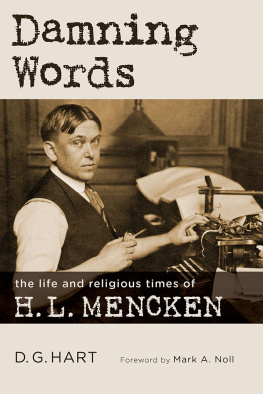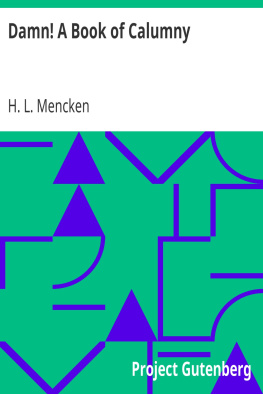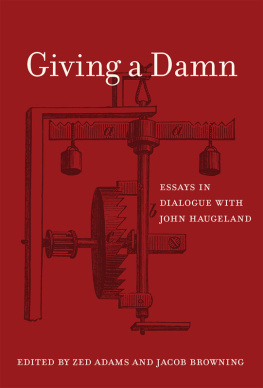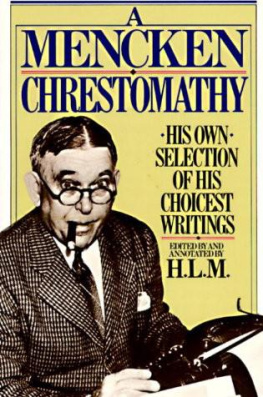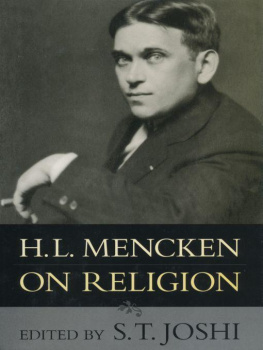Table of Contents
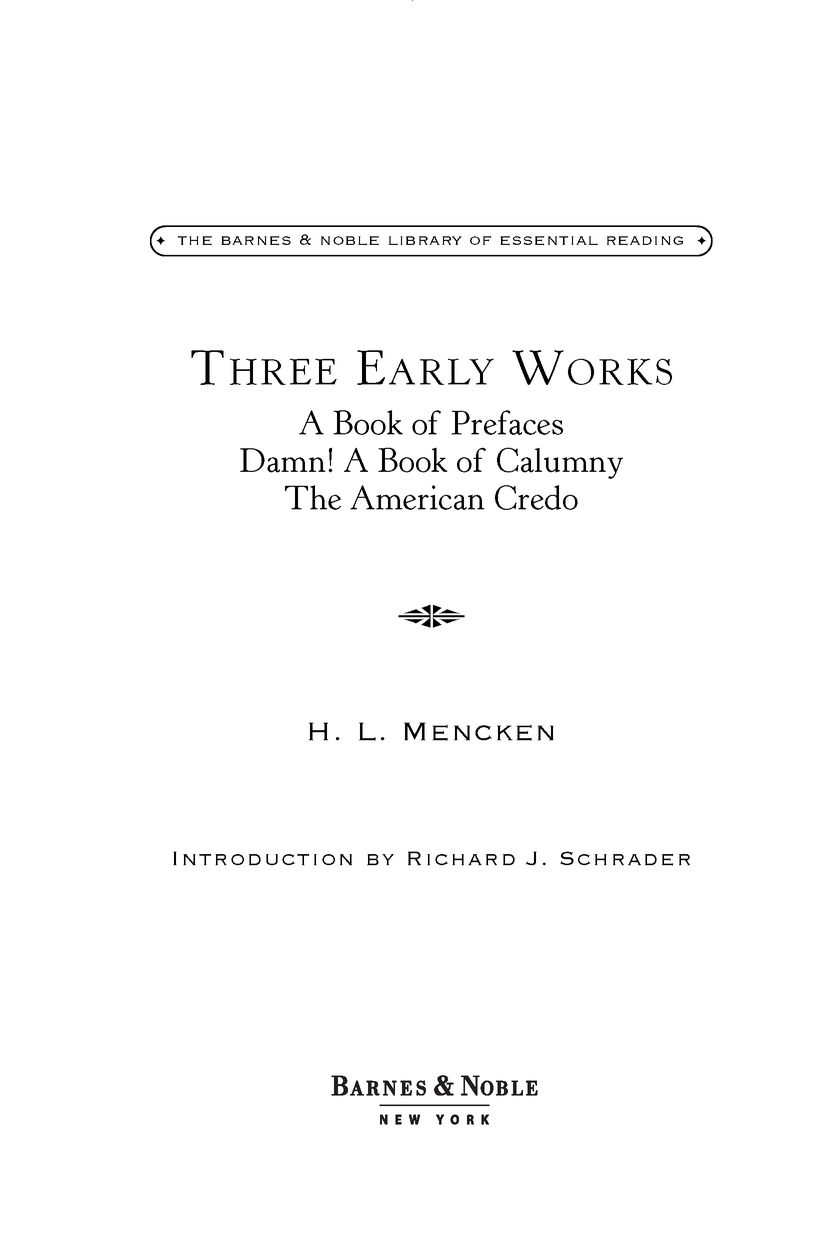
INTRODUCTION
HENRY LOUIS MENCKEN WAS POSSIBLY AMERICAS GREATEST AND most wide-ranging man of letters, in that he excelled as a journalist, essayist, philologist, satirist, political commentator, magazine editor, and literary critic. The various skills he demonstrated throughout his careers are amply displayed in the three works collected here: A Book of Prefaces (1917), Damn! A Book of Calumny (1918), and The American Credo: A Contribution Toward the Interpretation of the National Mind (1920). They were written at the end of his critical and journalistic apprenticeship, during World War I and its after-math. By this time, he had perfected his inimitable satiric style and had found among the disillusioned an audience for his literary and political theories. Mencken hurled his invective against the complacencies of the Jazz Age, and in the 1920s, as in the previous two decades, he had the most authoritative voice of any American writer. Novelist Richard Wright claimed in his memoir Black Boy that he discovered from A Book of Prefaces how words could be used as weapons. Edmund Wilson, a leading man of letters in the next generation, made the broader claim that Menckens public role was the civilized consciousness of modern America.
H. L. Mencken (1880-1956) lived his whole life in Baltimore. He graduated valedictorian (1896) from the Baltimore Polytechnic Institute, a high school, and was self-taught thereafter. As a newspaperman he was primarily associated with the Baltimore Sun, from 1906 until 1948 when a debilitating stroke prevented further writing. His columns reached a national audience through syndica tion, making him a well-known critic of war fever, every president from Roosevelt I to Roosevelt II, censorship, the Ku Klux Klan and rampant lynching in the South, Prohibition, and the residual Puritanism which, in his definition, underlay most of Americas problems. He directed his writing to what he called the civilized minority. He had another significant platform in the pages of two influential magazines. Mencken joined The Smart Set as book reviewer in 1908 and, with drama critic George Jean Nathan (1882-1958), edited it from 1914 to 1923. They resigned to become founding editors of The American Mercury the next year; Mencken stayed until 1933. Both journals featured his reviews and essays, as well as writing by others that bore his editorial stamp and usually reflected his point of view. His critical task, which is manifest in A Book of Prefaces, was to bring to the foreground the kind of realistic and naturalistic writing that had been developing since the end of the previous century. He advanced authors like Theodore Dreiser and Sinclair Lewis (and published James Joyce for the first time in America). He recruited women writers and gave more space to minority authors than any other white editor of his time. Menckens most famous work is his monumental The American Language, whose first edition (1919) appeared in the same fruitful period as the three books presented here. It was thoroughly revised for three later editions, the last in 1936. The latest version has been reprinted many times, along with two supplements (1945, 1948). It remains an enjoyable and respected survey of the subject. For all that, Mencken may be remembered just as long for the humorous New Yorker reminiscences that were collected into Happy Days (1940), Newspaper Days (1941), and Heathen Days (1943).
Mencken had to suspend many of his journalistic activities because of increasing restrictions on free speech during the lead-up to Americas entry into World War I. His loyalty was suspected because he supported Germany and opposed the calls for the United States to side with Britain and France. When he could no longer print such opinions, he began putting together the four essays that would comprise A Book of Prefaces: Joseph Conrad, Theodore Dreiser, James Huneker, and Puritanism as a Literary Force. He did so, as he said in the preface to the first printing, in hopes that they may at least blow a wind through the prevailing fogs, and reveal what is sound and important in some first-rate books. He later wrote that they set forth my objections to the whole Puritan Kultur in a large and positive way. The challenge was heard around the country, and the ensuing intellectual battle energized a generation. Because of the effect it had on his professional career, Mencken considered Prefaces to be his most important book.
Only marginally connected to the New England culture of colonial times, Puritanism was Menckens comprehensive term for what ailed the America he knew. It embraced such things as religious fundamentalism, Prohibition, the world-saving idealism of Woodrow Wilson, book-banning on the one hand, and literary timidity on the other. His chapter on the subject, the longest and most important in the book, assails classic American writers, including William Dean Howells (his immediate predecessor as chief man of letters), for their excessive restraint. Too often, he claims, moralism weakened their writing, and moralists set up hedges against those who would rebel. Puritanism was kept alive by such defenders of the genteel tradition as Paul Elmer More, Irving Babbitt, and Menckens arch-enemy among the critics, Stuart P. Sherman.
One aim of the chapter on Joseph Conrad (1857-1924) was to bring further recognition to this great novelist, whom Mencken had been one of the earliest American critics to promote. The effort was part of his campaign to arouse interest in the new literature and new ideas being produced in Europe. To that end he had written the first book on Irish playwright George Bernard Shaw (1905) and the first in English on German philosopher Friedrich Nietzsche (1908). He had even co-translated two plays by the Norwegian Henrik Ibsen (1909), at a time when the American stage was badly in need of models for the new trends in realism.
Like Conrad, Theodore Dreiser (1871-1945) is praised for not being a moralist. The chapter on him demonstrates why Mencken is still considered one of the best champions and most incisive critics of the novelist. Sister Carrie (1900), the manuscript of which Dreiser presented to Mencken in gratitude for his support, has been thought of as the literary fanfare for the twentieth century. Dreisers subsequent fiction realized Menckens ideas on what a novelist ought to be saying about the true (meaningless) nature of life, no matter the graceless style. In the fascinating correspondence between the two, published in 1986, one can see them working out their common agenda, despite misgivings on both sides and the occasional need to defend Dreiser against prudish censors. It was an agenda that benefited all subsequent authors who strove to write realistically about the American scene.
James Gibbons Huneker (1857-1921), whom Mencken had known since 1905, fascinated him primarily as a raconteur. Their friendship gave Mencken access to the larger esthetic world, both European and American. Hunekers lush style, moreover, was a major influence on that of Mencken, who soaked it in over beer at Lchows restaurant in New York City and from reading the extensive criticism of art, music, literature, and culture that flowed from Hunekers pen. He was a fellow anti-philistine and, for Mencken, that rarest of Americans, a civilized man. In fact, like Conrad and Dreiser, he is praised for his decidedly non-American qualities.
As a defender of Germany, Mencken was limited by the censorship of the times in what he could criticize about America. His choice of essays for the book continued his assault by indirec tion, generally avoiding the political commentary that might have gotten him into trouble. (The United States declared war on April 6, 1917, and



